UTS 91530 Case Study: Patient Suffering from Stage IV Cancer
VerifiedAdded on 2022/10/06
|6
|1613
|411
Case Study
AI Summary
This case study focuses on a 58-year-old male, Mark, diagnosed with Stage IV cancer, detailing his extensive medical history, including prior kidney infections, osteoarthritis, peptic ulcers, and depression. The analysis explores various treatment options, such as radical and partial nephrectomy, laparoscopic surgery, radiofrequency ablation, cryoablation, chemotherapy, immunotherapy, and radiation therapy. It critically assesses the likely outcomes based on the chosen treatment and the patient's psychological state, emphasizing the importance of a multidisciplinary approach, including nursing ethics, for optimal patient care and potential for improved outcomes. The study references several research articles to support the analysis of treatment options and patient outcomes.
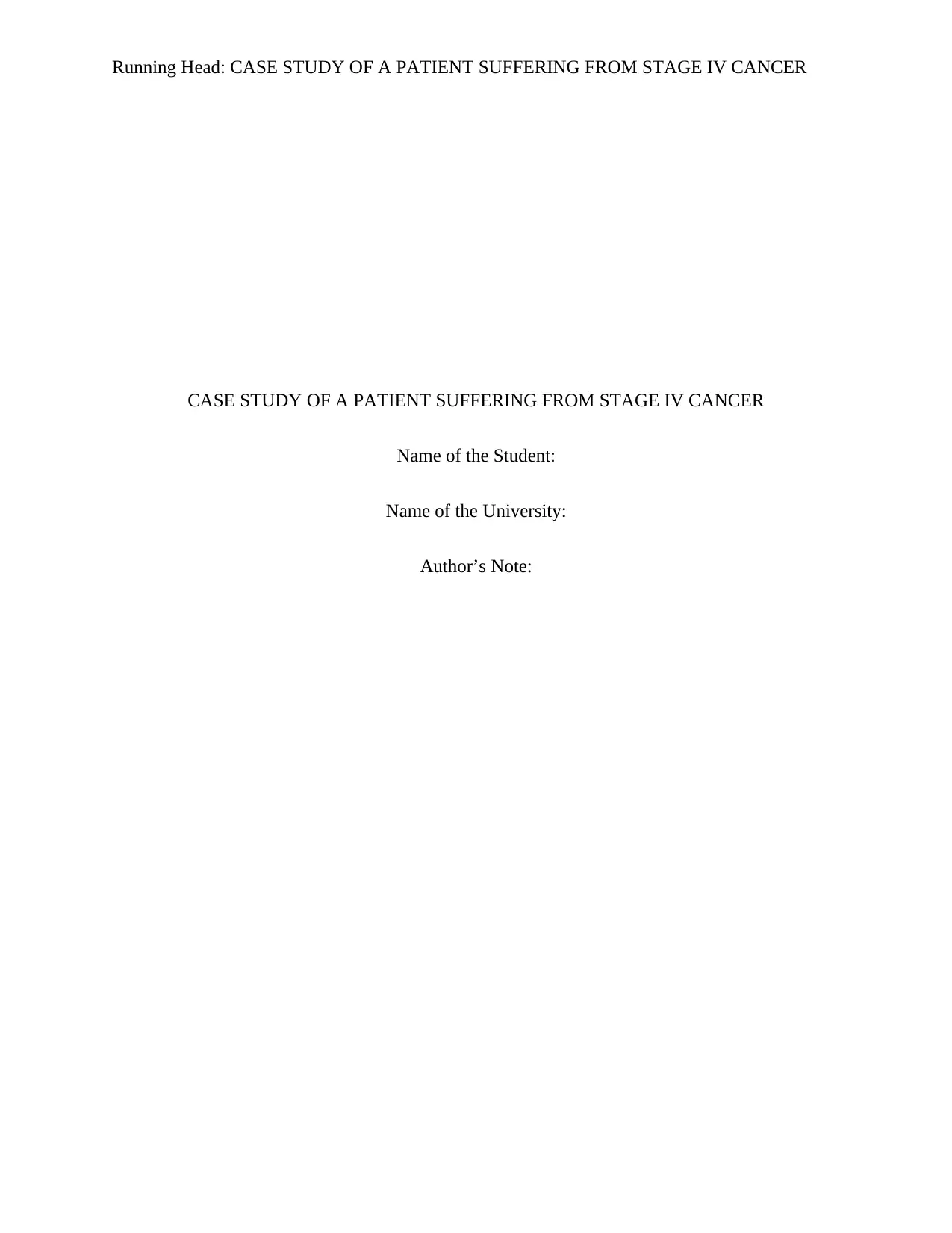
Running Head: CASE STUDY OF A PATIENT SUFFERING FROM STAGE IV CANCER
CASE STUDY OF A PATIENT SUFFERING FROM STAGE IV CANCER
Name of the Student:
Name of the University:
Author’s Note:
CASE STUDY OF A PATIENT SUFFERING FROM STAGE IV CANCER
Name of the Student:
Name of the University:
Author’s Note:
Paraphrase This Document
Need a fresh take? Get an instant paraphrase of this document with our AI Paraphraser
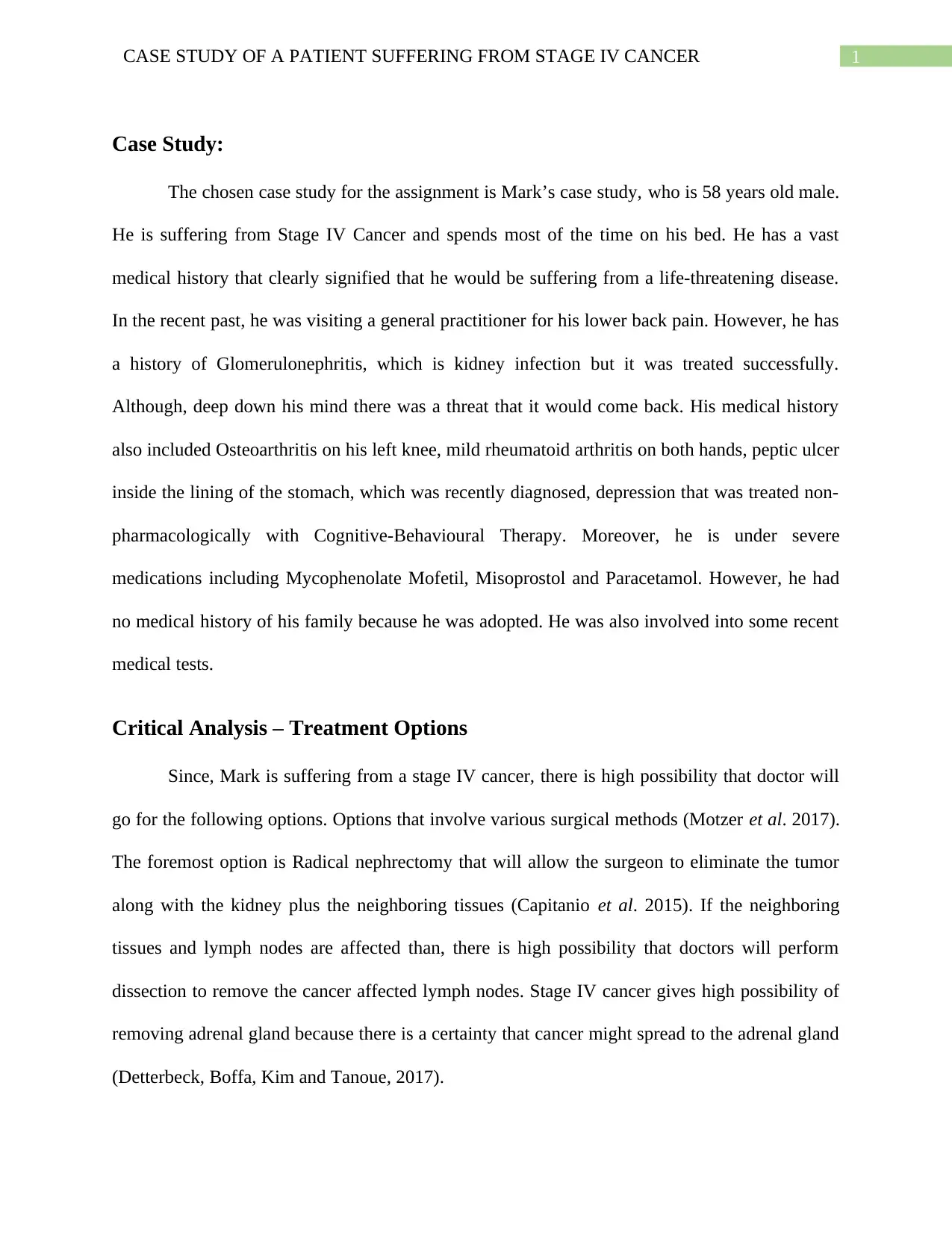
1CASE STUDY OF A PATIENT SUFFERING FROM STAGE IV CANCER
Case Study:
The chosen case study for the assignment is Mark’s case study, who is 58 years old male.
He is suffering from Stage IV Cancer and spends most of the time on his bed. He has a vast
medical history that clearly signified that he would be suffering from a life-threatening disease.
In the recent past, he was visiting a general practitioner for his lower back pain. However, he has
a history of Glomerulonephritis, which is kidney infection but it was treated successfully.
Although, deep down his mind there was a threat that it would come back. His medical history
also included Osteoarthritis on his left knee, mild rheumatoid arthritis on both hands, peptic ulcer
inside the lining of the stomach, which was recently diagnosed, depression that was treated non-
pharmacologically with Cognitive-Behavioural Therapy. Moreover, he is under severe
medications including Mycophenolate Mofetil, Misoprostol and Paracetamol. However, he had
no medical history of his family because he was adopted. He was also involved into some recent
medical tests.
Critical Analysis – Treatment Options
Since, Mark is suffering from a stage IV cancer, there is high possibility that doctor will
go for the following options. Options that involve various surgical methods (Motzer et al. 2017).
The foremost option is Radical nephrectomy that will allow the surgeon to eliminate the tumor
along with the kidney plus the neighboring tissues (Capitanio et al. 2015). If the neighboring
tissues and lymph nodes are affected than, there is high possibility that doctors will perform
dissection to remove the cancer affected lymph nodes. Stage IV cancer gives high possibility of
removing adrenal gland because there is a certainty that cancer might spread to the adrenal gland
(Detterbeck, Boffa, Kim and Tanoue, 2017).
Case Study:
The chosen case study for the assignment is Mark’s case study, who is 58 years old male.
He is suffering from Stage IV Cancer and spends most of the time on his bed. He has a vast
medical history that clearly signified that he would be suffering from a life-threatening disease.
In the recent past, he was visiting a general practitioner for his lower back pain. However, he has
a history of Glomerulonephritis, which is kidney infection but it was treated successfully.
Although, deep down his mind there was a threat that it would come back. His medical history
also included Osteoarthritis on his left knee, mild rheumatoid arthritis on both hands, peptic ulcer
inside the lining of the stomach, which was recently diagnosed, depression that was treated non-
pharmacologically with Cognitive-Behavioural Therapy. Moreover, he is under severe
medications including Mycophenolate Mofetil, Misoprostol and Paracetamol. However, he had
no medical history of his family because he was adopted. He was also involved into some recent
medical tests.
Critical Analysis – Treatment Options
Since, Mark is suffering from a stage IV cancer, there is high possibility that doctor will
go for the following options. Options that involve various surgical methods (Motzer et al. 2017).
The foremost option is Radical nephrectomy that will allow the surgeon to eliminate the tumor
along with the kidney plus the neighboring tissues (Capitanio et al. 2015). If the neighboring
tissues and lymph nodes are affected than, there is high possibility that doctors will perform
dissection to remove the cancer affected lymph nodes. Stage IV cancer gives high possibility of
removing adrenal gland because there is a certainty that cancer might spread to the adrenal gland
(Detterbeck, Boffa, Kim and Tanoue, 2017).
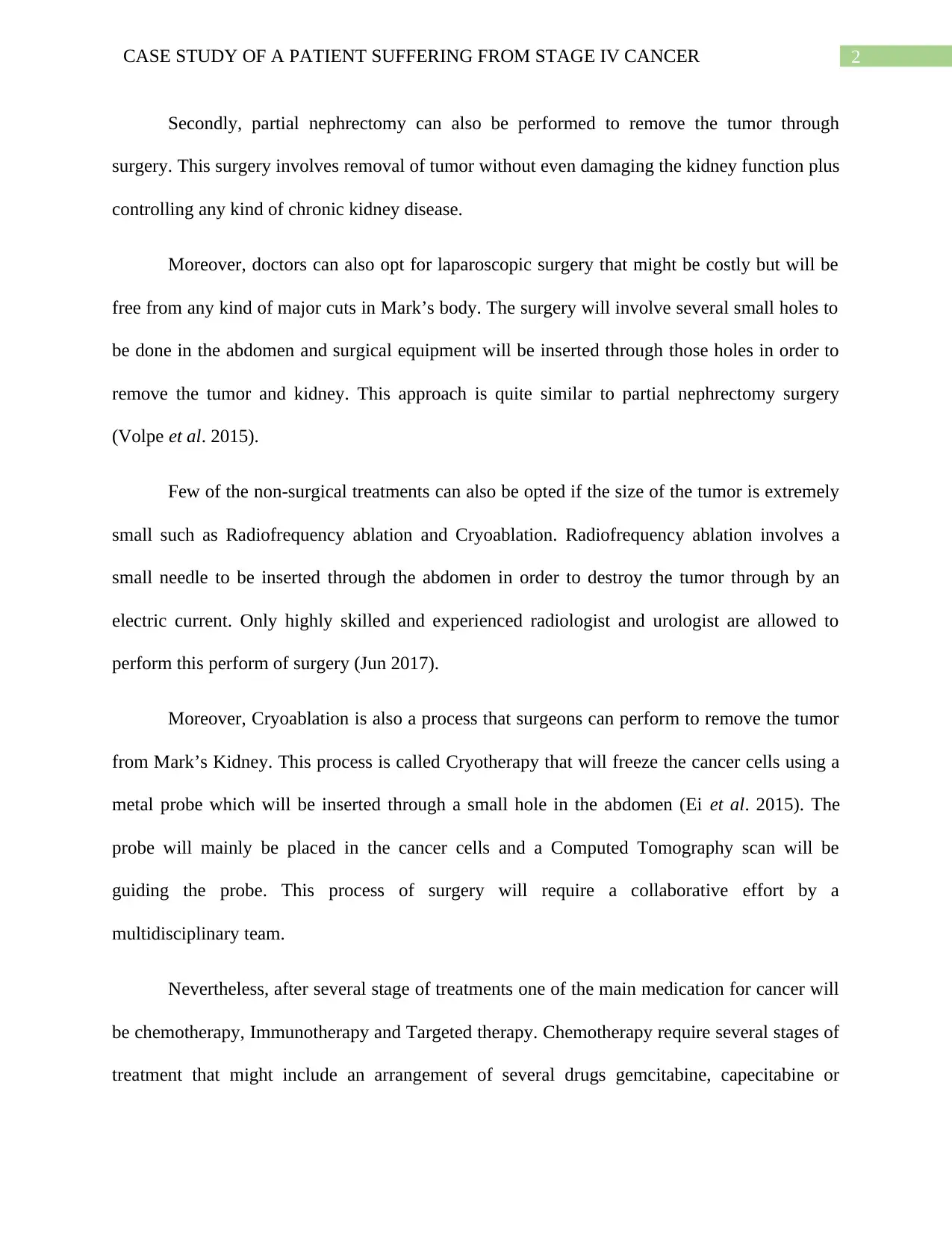
2CASE STUDY OF A PATIENT SUFFERING FROM STAGE IV CANCER
Secondly, partial nephrectomy can also be performed to remove the tumor through
surgery. This surgery involves removal of tumor without even damaging the kidney function plus
controlling any kind of chronic kidney disease.
Moreover, doctors can also opt for laparoscopic surgery that might be costly but will be
free from any kind of major cuts in Mark’s body. The surgery will involve several small holes to
be done in the abdomen and surgical equipment will be inserted through those holes in order to
remove the tumor and kidney. This approach is quite similar to partial nephrectomy surgery
(Volpe et al. 2015).
Few of the non-surgical treatments can also be opted if the size of the tumor is extremely
small such as Radiofrequency ablation and Cryoablation. Radiofrequency ablation involves a
small needle to be inserted through the abdomen in order to destroy the tumor through by an
electric current. Only highly skilled and experienced radiologist and urologist are allowed to
perform this perform of surgery (Jun 2017).
Moreover, Cryoablation is also a process that surgeons can perform to remove the tumor
from Mark’s Kidney. This process is called Cryotherapy that will freeze the cancer cells using a
metal probe which will be inserted through a small hole in the abdomen (Ei et al. 2015). The
probe will mainly be placed in the cancer cells and a Computed Tomography scan will be
guiding the probe. This process of surgery will require a collaborative effort by a
multidisciplinary team.
Nevertheless, after several stage of treatments one of the main medication for cancer will
be chemotherapy, Immunotherapy and Targeted therapy. Chemotherapy require several stages of
treatment that might include an arrangement of several drugs gemcitabine, capecitabine or
Secondly, partial nephrectomy can also be performed to remove the tumor through
surgery. This surgery involves removal of tumor without even damaging the kidney function plus
controlling any kind of chronic kidney disease.
Moreover, doctors can also opt for laparoscopic surgery that might be costly but will be
free from any kind of major cuts in Mark’s body. The surgery will involve several small holes to
be done in the abdomen and surgical equipment will be inserted through those holes in order to
remove the tumor and kidney. This approach is quite similar to partial nephrectomy surgery
(Volpe et al. 2015).
Few of the non-surgical treatments can also be opted if the size of the tumor is extremely
small such as Radiofrequency ablation and Cryoablation. Radiofrequency ablation involves a
small needle to be inserted through the abdomen in order to destroy the tumor through by an
electric current. Only highly skilled and experienced radiologist and urologist are allowed to
perform this perform of surgery (Jun 2017).
Moreover, Cryoablation is also a process that surgeons can perform to remove the tumor
from Mark’s Kidney. This process is called Cryotherapy that will freeze the cancer cells using a
metal probe which will be inserted through a small hole in the abdomen (Ei et al. 2015). The
probe will mainly be placed in the cancer cells and a Computed Tomography scan will be
guiding the probe. This process of surgery will require a collaborative effort by a
multidisciplinary team.
Nevertheless, after several stage of treatments one of the main medication for cancer will
be chemotherapy, Immunotherapy and Targeted therapy. Chemotherapy require several stages of
treatment that might include an arrangement of several drugs gemcitabine, capecitabine or
⊘ This is a preview!⊘
Do you want full access?
Subscribe today to unlock all pages.

Trusted by 1+ million students worldwide
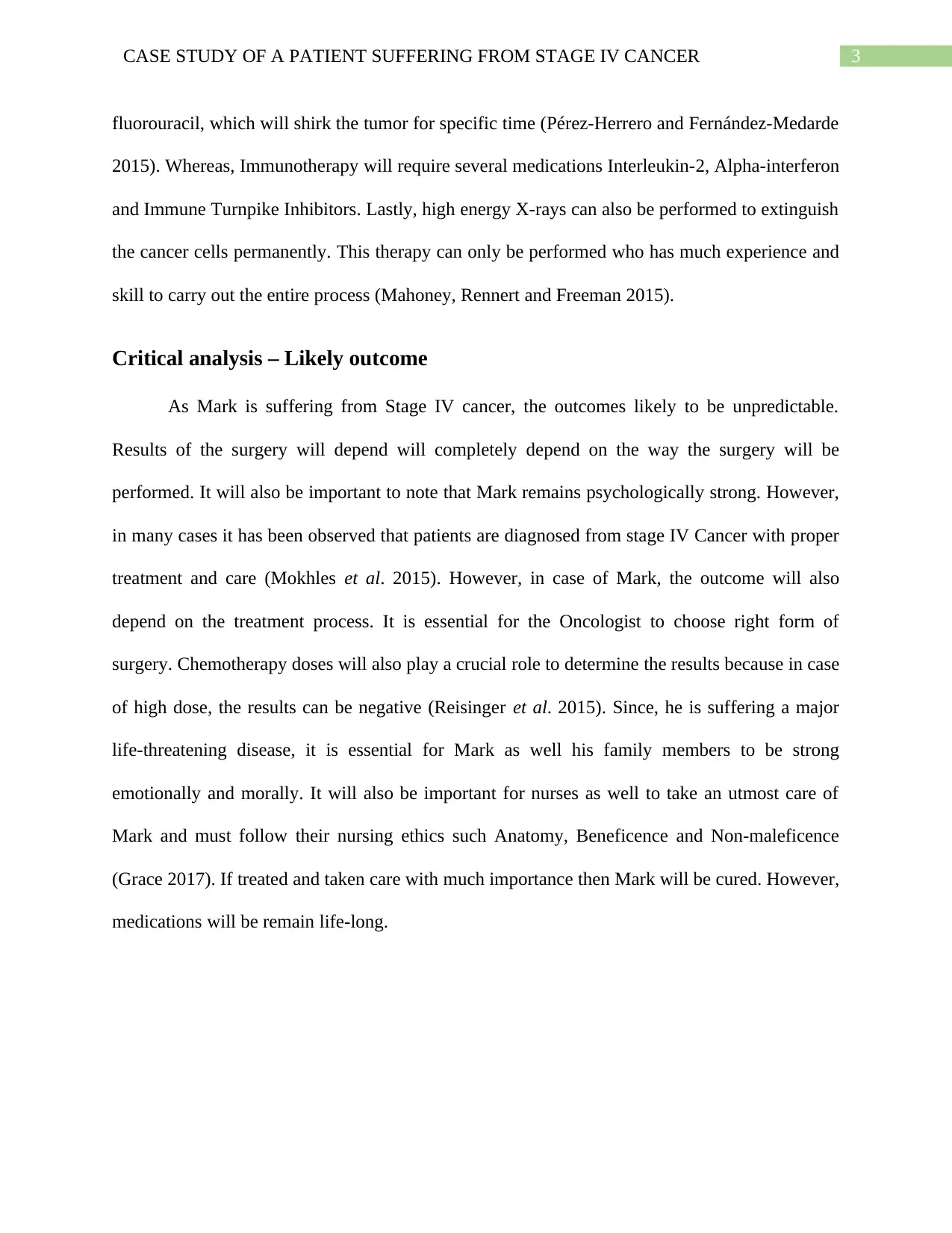
3CASE STUDY OF A PATIENT SUFFERING FROM STAGE IV CANCER
fluorouracil, which will shirk the tumor for specific time (Pérez-Herrero and Fernández-Medarde
2015). Whereas, Immunotherapy will require several medications Interleukin-2, Alpha-interferon
and Immune Turnpike Inhibitors. Lastly, high energy X-rays can also be performed to extinguish
the cancer cells permanently. This therapy can only be performed who has much experience and
skill to carry out the entire process (Mahoney, Rennert and Freeman 2015).
Critical analysis – Likely outcome
As Mark is suffering from Stage IV cancer, the outcomes likely to be unpredictable.
Results of the surgery will depend will completely depend on the way the surgery will be
performed. It will also be important to note that Mark remains psychologically strong. However,
in many cases it has been observed that patients are diagnosed from stage IV Cancer with proper
treatment and care (Mokhles et al. 2015). However, in case of Mark, the outcome will also
depend on the treatment process. It is essential for the Oncologist to choose right form of
surgery. Chemotherapy doses will also play a crucial role to determine the results because in case
of high dose, the results can be negative (Reisinger et al. 2015). Since, he is suffering a major
life-threatening disease, it is essential for Mark as well his family members to be strong
emotionally and morally. It will also be important for nurses as well to take an utmost care of
Mark and must follow their nursing ethics such Anatomy, Beneficence and Non-maleficence
(Grace 2017). If treated and taken care with much importance then Mark will be cured. However,
medications will be remain life-long.
fluorouracil, which will shirk the tumor for specific time (Pérez-Herrero and Fernández-Medarde
2015). Whereas, Immunotherapy will require several medications Interleukin-2, Alpha-interferon
and Immune Turnpike Inhibitors. Lastly, high energy X-rays can also be performed to extinguish
the cancer cells permanently. This therapy can only be performed who has much experience and
skill to carry out the entire process (Mahoney, Rennert and Freeman 2015).
Critical analysis – Likely outcome
As Mark is suffering from Stage IV cancer, the outcomes likely to be unpredictable.
Results of the surgery will depend will completely depend on the way the surgery will be
performed. It will also be important to note that Mark remains psychologically strong. However,
in many cases it has been observed that patients are diagnosed from stage IV Cancer with proper
treatment and care (Mokhles et al. 2015). However, in case of Mark, the outcome will also
depend on the treatment process. It is essential for the Oncologist to choose right form of
surgery. Chemotherapy doses will also play a crucial role to determine the results because in case
of high dose, the results can be negative (Reisinger et al. 2015). Since, he is suffering a major
life-threatening disease, it is essential for Mark as well his family members to be strong
emotionally and morally. It will also be important for nurses as well to take an utmost care of
Mark and must follow their nursing ethics such Anatomy, Beneficence and Non-maleficence
(Grace 2017). If treated and taken care with much importance then Mark will be cured. However,
medications will be remain life-long.
Paraphrase This Document
Need a fresh take? Get an instant paraphrase of this document with our AI Paraphraser
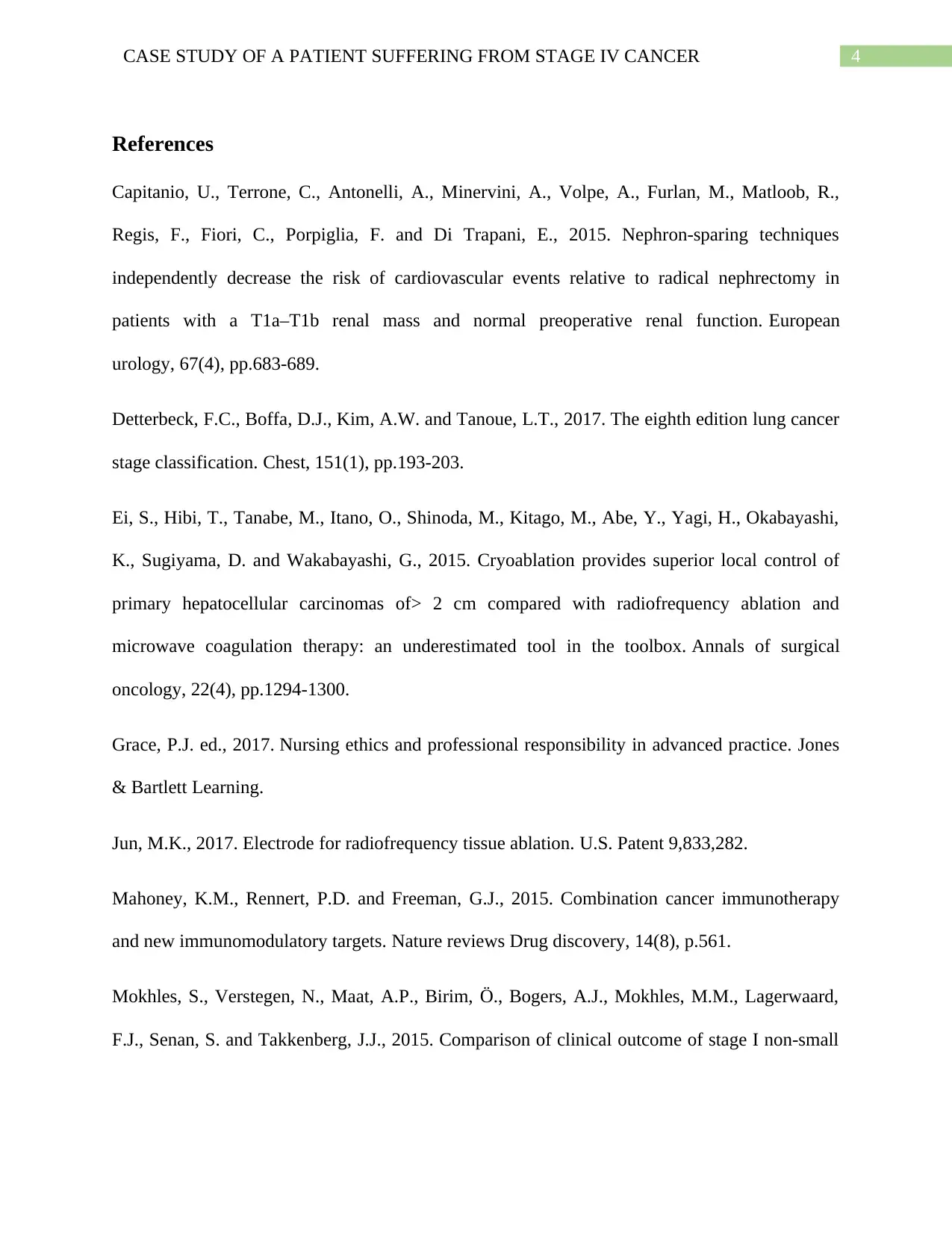
4CASE STUDY OF A PATIENT SUFFERING FROM STAGE IV CANCER
References
Capitanio, U., Terrone, C., Antonelli, A., Minervini, A., Volpe, A., Furlan, M., Matloob, R.,
Regis, F., Fiori, C., Porpiglia, F. and Di Trapani, E., 2015. Nephron-sparing techniques
independently decrease the risk of cardiovascular events relative to radical nephrectomy in
patients with a T1a–T1b renal mass and normal preoperative renal function. European
urology, 67(4), pp.683-689.
Detterbeck, F.C., Boffa, D.J., Kim, A.W. and Tanoue, L.T., 2017. The eighth edition lung cancer
stage classification. Chest, 151(1), pp.193-203.
Ei, S., Hibi, T., Tanabe, M., Itano, O., Shinoda, M., Kitago, M., Abe, Y., Yagi, H., Okabayashi,
K., Sugiyama, D. and Wakabayashi, G., 2015. Cryoablation provides superior local control of
primary hepatocellular carcinomas of> 2 cm compared with radiofrequency ablation and
microwave coagulation therapy: an underestimated tool in the toolbox. Annals of surgical
oncology, 22(4), pp.1294-1300.
Grace, P.J. ed., 2017. Nursing ethics and professional responsibility in advanced practice. Jones
& Bartlett Learning.
Jun, M.K., 2017. Electrode for radiofrequency tissue ablation. U.S. Patent 9,833,282.
Mahoney, K.M., Rennert, P.D. and Freeman, G.J., 2015. Combination cancer immunotherapy
and new immunomodulatory targets. Nature reviews Drug discovery, 14(8), p.561.
Mokhles, S., Verstegen, N., Maat, A.P., Birim, Ö., Bogers, A.J., Mokhles, M.M., Lagerwaard,
F.J., Senan, S. and Takkenberg, J.J., 2015. Comparison of clinical outcome of stage I non-small
References
Capitanio, U., Terrone, C., Antonelli, A., Minervini, A., Volpe, A., Furlan, M., Matloob, R.,
Regis, F., Fiori, C., Porpiglia, F. and Di Trapani, E., 2015. Nephron-sparing techniques
independently decrease the risk of cardiovascular events relative to radical nephrectomy in
patients with a T1a–T1b renal mass and normal preoperative renal function. European
urology, 67(4), pp.683-689.
Detterbeck, F.C., Boffa, D.J., Kim, A.W. and Tanoue, L.T., 2017. The eighth edition lung cancer
stage classification. Chest, 151(1), pp.193-203.
Ei, S., Hibi, T., Tanabe, M., Itano, O., Shinoda, M., Kitago, M., Abe, Y., Yagi, H., Okabayashi,
K., Sugiyama, D. and Wakabayashi, G., 2015. Cryoablation provides superior local control of
primary hepatocellular carcinomas of> 2 cm compared with radiofrequency ablation and
microwave coagulation therapy: an underestimated tool in the toolbox. Annals of surgical
oncology, 22(4), pp.1294-1300.
Grace, P.J. ed., 2017. Nursing ethics and professional responsibility in advanced practice. Jones
& Bartlett Learning.
Jun, M.K., 2017. Electrode for radiofrequency tissue ablation. U.S. Patent 9,833,282.
Mahoney, K.M., Rennert, P.D. and Freeman, G.J., 2015. Combination cancer immunotherapy
and new immunomodulatory targets. Nature reviews Drug discovery, 14(8), p.561.
Mokhles, S., Verstegen, N., Maat, A.P., Birim, Ö., Bogers, A.J., Mokhles, M.M., Lagerwaard,
F.J., Senan, S. and Takkenberg, J.J., 2015. Comparison of clinical outcome of stage I non-small
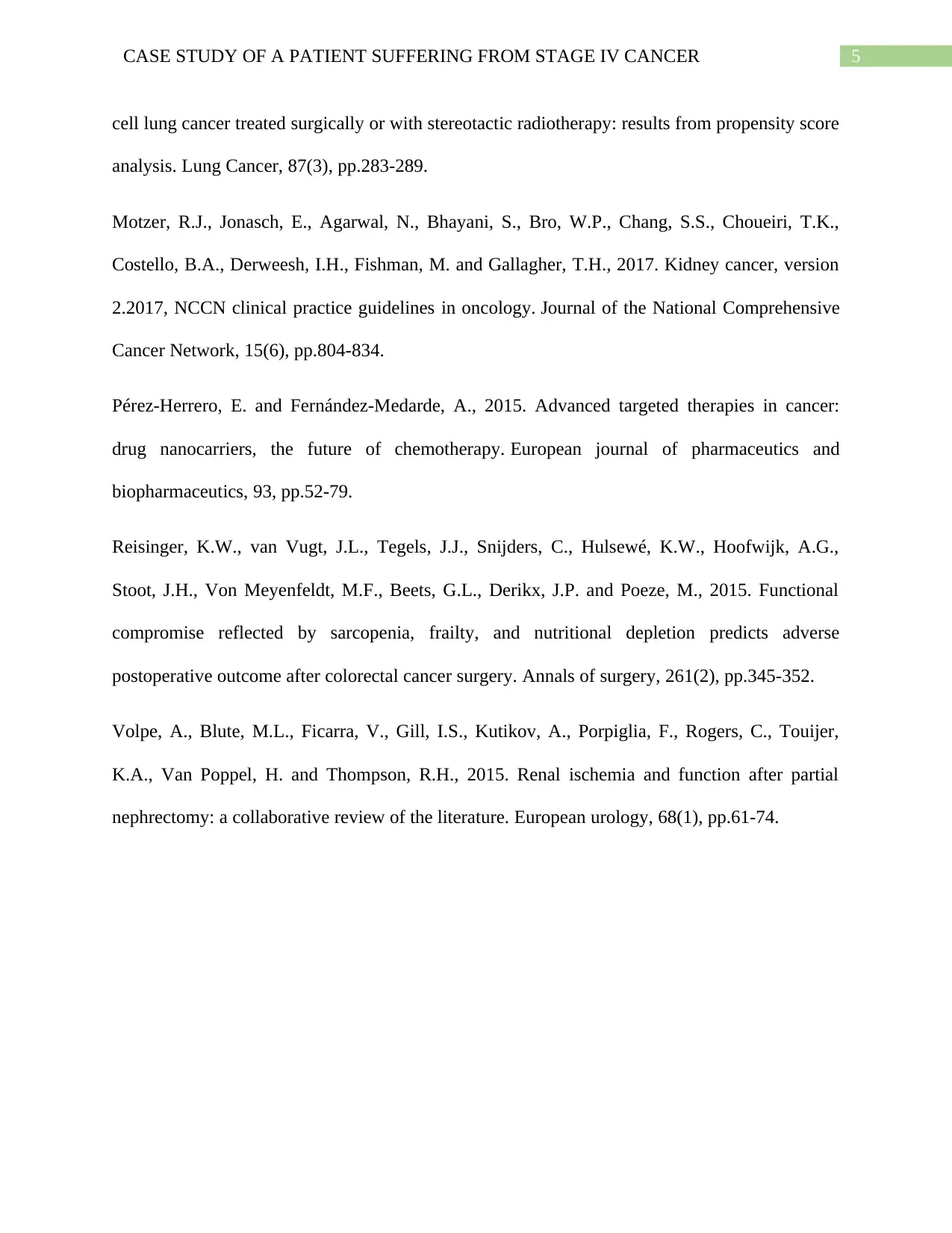
5CASE STUDY OF A PATIENT SUFFERING FROM STAGE IV CANCER
cell lung cancer treated surgically or with stereotactic radiotherapy: results from propensity score
analysis. Lung Cancer, 87(3), pp.283-289.
Motzer, R.J., Jonasch, E., Agarwal, N., Bhayani, S., Bro, W.P., Chang, S.S., Choueiri, T.K.,
Costello, B.A., Derweesh, I.H., Fishman, M. and Gallagher, T.H., 2017. Kidney cancer, version
2.2017, NCCN clinical practice guidelines in oncology. Journal of the National Comprehensive
Cancer Network, 15(6), pp.804-834.
Pérez-Herrero, E. and Fernández-Medarde, A., 2015. Advanced targeted therapies in cancer:
drug nanocarriers, the future of chemotherapy. European journal of pharmaceutics and
biopharmaceutics, 93, pp.52-79.
Reisinger, K.W., van Vugt, J.L., Tegels, J.J., Snijders, C., Hulsewé, K.W., Hoofwijk, A.G.,
Stoot, J.H., Von Meyenfeldt, M.F., Beets, G.L., Derikx, J.P. and Poeze, M., 2015. Functional
compromise reflected by sarcopenia, frailty, and nutritional depletion predicts adverse
postoperative outcome after colorectal cancer surgery. Annals of surgery, 261(2), pp.345-352.
Volpe, A., Blute, M.L., Ficarra, V., Gill, I.S., Kutikov, A., Porpiglia, F., Rogers, C., Touijer,
K.A., Van Poppel, H. and Thompson, R.H., 2015. Renal ischemia and function after partial
nephrectomy: a collaborative review of the literature. European urology, 68(1), pp.61-74.
cell lung cancer treated surgically or with stereotactic radiotherapy: results from propensity score
analysis. Lung Cancer, 87(3), pp.283-289.
Motzer, R.J., Jonasch, E., Agarwal, N., Bhayani, S., Bro, W.P., Chang, S.S., Choueiri, T.K.,
Costello, B.A., Derweesh, I.H., Fishman, M. and Gallagher, T.H., 2017. Kidney cancer, version
2.2017, NCCN clinical practice guidelines in oncology. Journal of the National Comprehensive
Cancer Network, 15(6), pp.804-834.
Pérez-Herrero, E. and Fernández-Medarde, A., 2015. Advanced targeted therapies in cancer:
drug nanocarriers, the future of chemotherapy. European journal of pharmaceutics and
biopharmaceutics, 93, pp.52-79.
Reisinger, K.W., van Vugt, J.L., Tegels, J.J., Snijders, C., Hulsewé, K.W., Hoofwijk, A.G.,
Stoot, J.H., Von Meyenfeldt, M.F., Beets, G.L., Derikx, J.P. and Poeze, M., 2015. Functional
compromise reflected by sarcopenia, frailty, and nutritional depletion predicts adverse
postoperative outcome after colorectal cancer surgery. Annals of surgery, 261(2), pp.345-352.
Volpe, A., Blute, M.L., Ficarra, V., Gill, I.S., Kutikov, A., Porpiglia, F., Rogers, C., Touijer,
K.A., Van Poppel, H. and Thompson, R.H., 2015. Renal ischemia and function after partial
nephrectomy: a collaborative review of the literature. European urology, 68(1), pp.61-74.
⊘ This is a preview!⊘
Do you want full access?
Subscribe today to unlock all pages.

Trusted by 1+ million students worldwide
1 out of 6
Related Documents
Your All-in-One AI-Powered Toolkit for Academic Success.
+13062052269
info@desklib.com
Available 24*7 on WhatsApp / Email
![[object Object]](/_next/static/media/star-bottom.7253800d.svg)
Unlock your academic potential
Copyright © 2020–2025 A2Z Services. All Rights Reserved. Developed and managed by ZUCOL.





